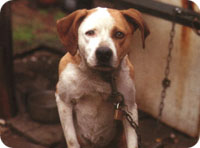All About Animals: Companion Animals
 Do you know how excited your dogs are when you come home from school? They have probably spent all day waiting to see you. What do you do when you see them?
Do you know how excited your dogs are when you come home from school? They have probably spent all day waiting to see you. What do you do when you see them?
- Rush straight past them, grab your football and leave the house again without them.
- Pat them on the head and tell them that you’ll play with them later.
- Grab a ball, put on their leads and head straight to the park for fun and frolicking.
You are their best friend, and they love to spend time with you, just like you love to spend time with your best friend. So why not include them in your games? They’ll have a great time, and you’ll know that you are being a best friend to them, too.
Whether you share your home with a dog or a goldfish or two, it’s important that you look after them very, very well. They depend on you and your family to give them the things they need and to do what it takes to give them good lives – fun stuff like playing and taking walks in the park as well as not-so-fun stuff like keeping their bedding clean and making sure they have enough good food and fresh water. If we forget to do any of these things, they can get hungry or thirsty, become sad and lonely or feel sick. And no one wants to hurt his or her best friend!
Dogs and cats used to live in the wild. Now we say they are ‘domesticated’ because they live with humans. People believe that dogs were domesticated 15,000 years ago, when humans in Asia took wolf cubs away from their packs. Years of living with humans have changed the way dogs think – even puppies know how to ‘read’ people and understand what they’re saying. Perhaps we ought to learn how to ‘read’ dogs better, too!
Cats were first domesticated about 9,500 years ago. People in the Far East thought cats brought good luck, but today, cats who are left to fend for themselves outside need all the luck they can get just to survive.
All animals need the following things:
- Good food
- Fresh, clean water
- Freedom to run and play safely
- Friends (no animal wants to be lonely)
- Comfort
- Respect
- Consideration
If you live with an animal, it’s a good idea to go over this list every day to make sure that your companion has everything that he or she needs to be happy and healthy.
Think about the animals in your life. Could you be doing more to make them happy and help them safely satisfy their natural instincts? For example, many dogs like to sniff everything in their paths during walks – they get their daily news by sniffing the lamp posts and tree trunks. Do you yank your dog – ‘Hurry up!’ – or do you let him or her sniff away and find out what’s new in the neighbourhood? And cats want and need to scratch. Do your cats have a scratching post or do they get told off when they try to stretch their claws on the couch?
‘I want an animal!’ Have you ever said this to your mum or dad? People keep animals because they want to, but properly looking after an animal means giving love and care all the time. Animals give us great pleasure and lots of love, and we must give something back: a safe, caring and loving home.
Living with an animal can be a lot of work! Some people find out that keeping an animal is too much trouble, and they decide that they don’t want the responsibility. Can you think of any reasons why people might decide that they don’t want their cat or dog or bunny anymore? Sometimes, people discover that their new animal companion moults too much (this means the animal leaves fur everywhere), smells, barks too much, claws the furniture or makes them sneeze.
Is it fair to throw an animal out of the house for those reasons? Where do animals go when they aren’t wanted anymore? Some animals end up at animal shelters, and someone else might decide to take them home and love them.
Talk About: Topics to Chat About!
1. How do you feel about keeping animals in cages?
2. Is it right to keep an animal if he or she isn’t happy?
3. How important is it that you put the needs of your animal companion first?
4. Should everyone be allowed to look after an animal?
5. What are the seven things you should make sure your companion animal has? (See the list above for a clue.)

